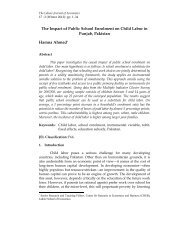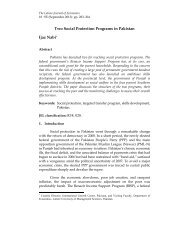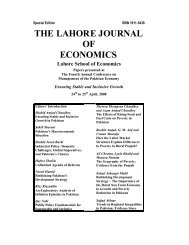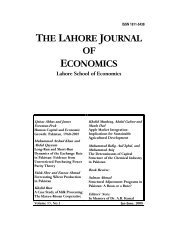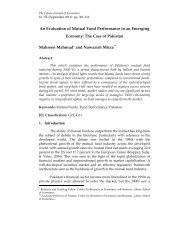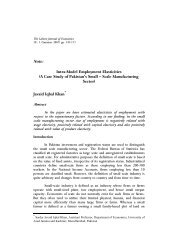Special Edition-07.pdf - Lahore School of Economics
Special Edition-07.pdf - Lahore School of Economics
Special Edition-07.pdf - Lahore School of Economics
Create successful ePaper yourself
Turn your PDF publications into a flip-book with our unique Google optimized e-Paper software.
The <strong>Lahore</strong> Journal <strong>of</strong> <strong>Economics</strong><br />
<strong>Special</strong> <strong>Edition</strong> (September 2007)<br />
Financial Sector Restructuring in Pakistan<br />
Muhammad Arshad Khan and Sajawal Khan *<br />
Abstract<br />
In this paper an attempt has been made to review the financial<br />
restructuring process and its importance for economic growth and<br />
macroeconomic stability. The main focus is on the financial restructuring<br />
efforts undertaken by the government <strong>of</strong> Pakistan since 1990. We also<br />
analyze the impact <strong>of</strong> financial restructuring by using various financial<br />
indicators. The overall results suggest that the financial industry in<br />
Pakistan is showing remarkable and unprecedented growth. Unlike 1990,<br />
the performance <strong>of</strong> the financial sector is much better today. After the<br />
successful completion <strong>of</strong> first generation reforms, the introduction <strong>of</strong> second<br />
generation reforms is required, which will help to further strengthen the<br />
financial system and transfer the benefits <strong>of</strong> the first generation reforms to<br />
society.<br />
I. Introduction<br />
In a modern economy, an efficient financial system is essential to<br />
facilitate economic transactions, specialize in production, and establish<br />
investor-friendly institutions and competitive markets. A stable and efficient<br />
financial system not only reduces uncertainty and the cost <strong>of</strong> transactions but<br />
also improves overall economic efficiency through the efficient allocation <strong>of</strong><br />
resources. A more balanced and vibrant financial system will contribute to<br />
economic growth and the stability <strong>of</strong> the economy. In contrast, regulated<br />
financial systems lead to underdeveloped and incompetitive markets, with a<br />
financial sector dominated by government owned financial institutions that<br />
impose constraints on economic growth. It is now widely recognized that<br />
weak and inefficient financial systems are more vulnerable to contagion, less<br />
able to cope with volatile capital flows and exchange market pressures, and<br />
more likely to propagate and magnify the effects <strong>of</strong> financial crises. This<br />
* The authors are respectively Associate Pr<strong>of</strong>essor Government Post-graduate College<br />
Muzaffarabad (Azad Kashmir) and Lecturer Government Degree College Ghazi, Haripur<br />
(NWFP) and both are currently working as Research Associates, Pakistan Institute <strong>of</strong><br />
Development <strong>Economics</strong>, Islamabad.



